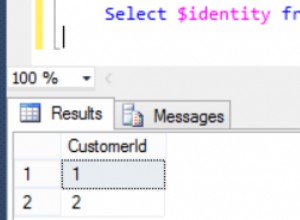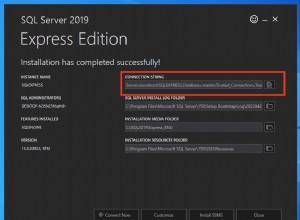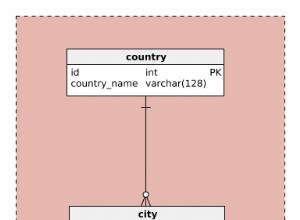Spring Data JPA a partir de 1.11.1 no es compatible con los SP que devuelven conjuntos de resultados. Presenté un defecto correspondiente con datos de primavera.
La solución es descender un nivel de API y simplemente usar JPA. Aquí hay una clase genérica que escribí que funciona con MS SQL SP.
import com.google.common.base.Strings;
import java.util.List;
import javax.persistence.EntityManager;
import javax.persistence.ParameterMode;
import javax.persistence.Query;
import javax.persistence.StoredProcedureQuery;
import lombok.RequiredArgsConstructor;
import org.springframework.beans.factory.annotation.Autowired;
import org.springframework.stereotype.Service;
@Service
@RequiredArgsConstructor(onConstructor = @__(@Autowired))
public class StoredProcRepository {
//region Injected beans (via a RequiredArgsConstructor)
private final EntityManager em;
//endregion
/**
* Calls a stored procedure via JPA and retrieves a single implicit result set (in DBs that
* support them e.g. MS SQL or MySQL). The call is not dependent on a DB dialect. Be
* aware that large result sets should be paginated and not entirely read to memory. Recreates
* StoredProcedureQuery instance and its parameters on each call.
* To execute MS SQL SPs performing multiple queries, SET NOCOUNT ON.
*
* @param procedureName stored procedure name, optionally qualified per DB syntax
* @param resultClass converts (maps) each result set row into instances of resultClass via JPA
* @param spArgs stored procedure arguments, supplied positionally (optional SP arguments at the
* end of the list could be omitted)
* @param <T> class of row instances converted per JPA
* @return the entire result set
*/
public <T> List<T> queryViaStoredProc(String procedureName, Class<T> resultClass,
Object... spArgs) {
StoredProcedureQuery spq = em.createStoredProcedureQuery(procedureName, resultClass);
int pos = 0;
for (Object arg : spArgs) {
spq.registerStoredProcedureParameter(++pos, arg.getClass(), ParameterMode.IN);
spq.setParameter(pos, arg);
}
return spq.getResultList();
}
/**
* Calls a stored procedure via JPA and retrieves only the top row of a single implicit result
* set (in DBs that support them e.g. MS SQL or MySQL).
* Assumes that result set has at least one row.
* The call is not dependent on a DB dialect.
* Be aware that large result sets should be paginated and not entirely read to memory.
* Recreates StoredProcedureQuery instance and its parameters on each call.
* To execute MS SQL SPs performing multiple queries, SET NOCOUNT ON.
*
* @param procedureName stored procedure name, optionally qualified per DB syntax
* @param resultClass converts (maps) each result set row into instances of resultClass via JPA
* @param spArgs stored procedure arguments, supplied positionally (optional SP arguments at the
* end of the list could be omitted)
* @param <T> class of row instances converted per JPA
* @return the entire result set
*/
public <T> T queryTopRowViaStoredProc(String procedureName, Class<T> resultClass,
Object... spArgs) {
return queryViaStoredProc(procedureName, resultClass, spArgs).get(0);
}
}
Para MS SQL SP, el requisito adicional es tener SET NOCOUNT ON para todos los SP que ejecutan más de una consulta. Esto podría establecerse en una de al menos tres formas:
- En un envoltorio de Java genérico usando JPA (vea el código a continuación). Este enfoque solo funciona con el controlador jTDS JDBC. Un problema correspondiente se ha archivado con el proyecto de controlador MS JDBC.
- Al comienzo de cada SP.
- Globalmente en su base de datos .
Su código es para el n.° 1:métodos correspondientes para el mismo StoredProcRepository clase.
/**
* Calls an MS SQL stored procedure via JPA and retrieves a single implicit result set.
* Protects against lack of SET NOCOUNT in stored procedures.
* This works with jTDS JDBC driver, but not with MS JDBC driver.
* Be aware that large result sets should be paginated and not entirely read to memory.
*
* @param procedureName stored procedure name, optionally qualified per DB syntax
* @param resultClass converts (maps) each result set row into instances of resultClass via JPA
* @param spArgs stored procedure arguments, supplied positionally (optional SP arguments at the
* end of the list could be omitted)
* @param <T> class of row instances converted per JPA
* @return the entire result set
*/
public <T> List<T> queryViaMsSqlStoredProc(String procedureName, Class<T> resultClass,
Object... spArgs) {
String spBindParams = (spArgs.length == 0) ? "" : "?" + Strings.repeat(",?", spArgs.length - 1);
// The following works with jTDS driver, but not with MS driver
String spQuery = String.format("EXEC %s %s", procedureName, spBindParams);
// The following works with jTDS driver, but not with MS driver
/*
String spQuery = String.format("{call %s(%s)}", procedureName, spBindParams);
Query q = em.createNativeQuery("SET NOCOUNT ON; " + spQuery, resultClass)
.setHint("org.hibernate.readOnly", true);
*/
Query q = em.createNativeQuery(spQuery, resultClass);
int pos = 0;
for (Object arg : spArgs) {
q.setParameter(++pos, arg);
}
return q.getResultList();
}
/**
* Calls an MS SQL stored procedure via JPA and retrieves only the top row of a single implicit
* result set.
* Assumes that result set has at least one row.
* The call sets the "NOCOUNT ON" MS SQL batch option.
* Be aware that large result sets should be paginated and not entirely read to memory.
*
* @param procedureName stored procedure name, optionally qualified per DB syntax
* @param resultClass converts (maps) each result set row into instances of resultClass via JPA
* @param spArgs stored procedure arguments, supplied positionally (optional SP arguments at the
* end of the list could be omitted)
* @param <T> class of row instances converted per JPA
* @return the entire result set
*/
public <T> T queryTopRowViaMsSqlStoredProc(String procedureName, Class<T> resultClass,
Object... spArgs) {
return queryViaMsSqlStoredProc(procedureName, resultClass, spArgs).get(0);
}




